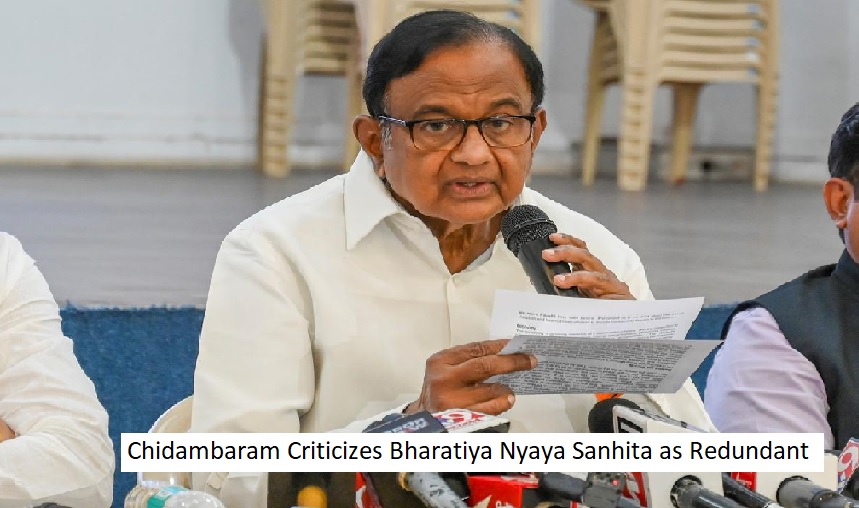


P. Chidambaram, a Member of Parliament and Senior Advocate, has expressed strong dissent regarding the three Bills introduced by the Union Government aimed at replacing the Indian Penal Code (IPC). In his submission to the Parliamentary Standing Committee on Home Affairs, Chidambaram characterized these Bills as essentially a "copy and paste" of existing laws, dismissing them as a redundant and wasteful exercise with potentially adverse consequences.
According to Chidambaram, the proposed Bills largely replicate the content of current laws, making minimal changes that he deems both acceptable and unacceptable. He points out that the primary modifications involve the rearrangement of sections within existing laws and the merging of different sections into a single section with numerous sub-sections. As an example, he highlights the offense of murder, traditionally denoted as Section 302 in the IPC, which is renumbered as Section 101 in the proposed Bharatiya Nyaya Sanhita.
Chidambaram argues that the enactment of these Bills would impose significant inconvenience and hardship on a vast number of professionals and the general public. Judges, lawyers, police officers, and citizens would need to familiarize themselves with the revised laws, a process that he predicts would take years before the new provisions are extensively utilized. He questions the motivation behind this legislative effort, suggesting that it seems more like an exercise in self-glorification than a scholarly attempt to enhance existing laws.
The crux of Chidambaram's critique lies in his assertion that the Bharatiya Nyaya Sanhita is essentially a copy-paste exercise, incorporating nearly 90-95% of the IPC's content. He contends that any improvements or changes could have been easily integrated into the IPC through amendments, eliminating the need for an entirely new legal framework.
Beyond the content of the Bills, Chidambaram also raises objections to the Hindi titles assigned to them. He refers to Article 348 of the Constitution, which mandates that all Acts be in the English language, with translations into other Indian languages permitted. Chidambaram argues that the Bills' names should be in English, translated into Hindi, and then further translated into other Indian languages. He finds the exclusive use of Hindi in the titles objectionable, asserting that it is unconstitutional, a slight to non-Hindi speakers, such as Tamils, Gujaratis, or Bengalis, and contrary to the principles of federalism.
Moreover, Chidambaram highlights the lack of consultation with various stakeholders during the consideration stage of these Bills. He notes that state governments, Bar Associations, state and central police organizations, the Indian Police Foundation, the National Law School Universities, judges of the subordinate judiciary, retired judges of the Supreme Court and High Courts, senior advocates, and legal scholars were not consulted before the Bills were introduced. He strongly objects to this process, citing insufficiency, non-inclusionary practices, lack of scholarly input, and inadequate time for consideration by Members of Parliament.
The backdrop for Chidambaram's dissent is the introduction of these Bills during the last day of the monsoon session. The Central Government's move to repeal and replace the IPC, the Code of Criminal Procedure (CrPC), and the Indian Evidence Act with these Bills has sparked significant controversy and raised concerns about the legislative process, consultation, and the necessity of such a comprehensive legal overhaul.
In summary, P. Chidambaram's dissenting perspective on the Union Government's Bills revolves around their perceived lack of substantive improvement, their status as a redundant copy-paste exercise, the constitutional issue of Hindi-only titles, and the absence of proper consultation with key stakeholders. The broader implication is a call for a more thoughtful and inclusive legislative process that addresses the concerns of various stakeholders and ensures the effective, fair, and constitutionally sound evolution of India's legal framework.
TAGS: P. Chidambaram Union Government Bharatiya Nyaya Sanhita Indian Penal Code (IPC) Dissent